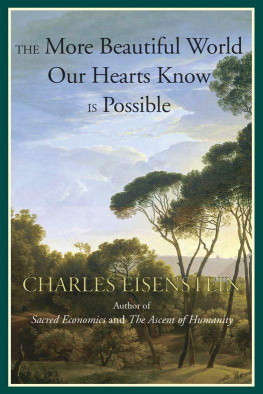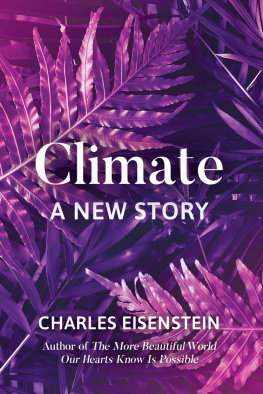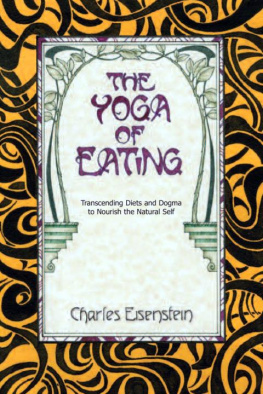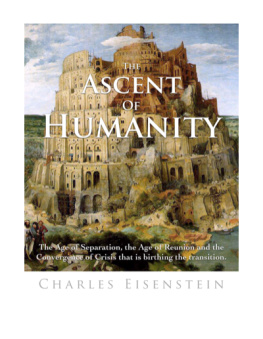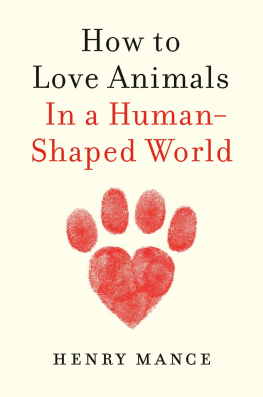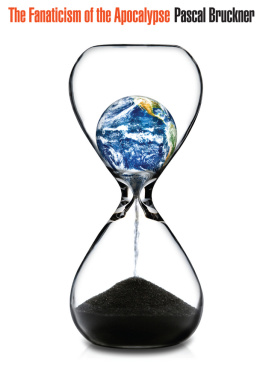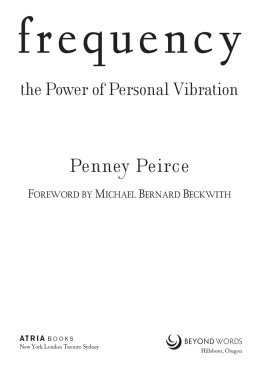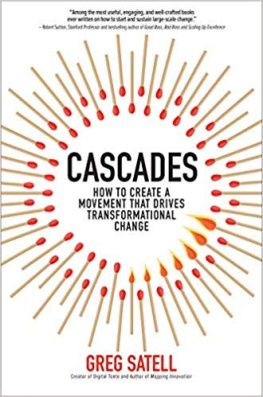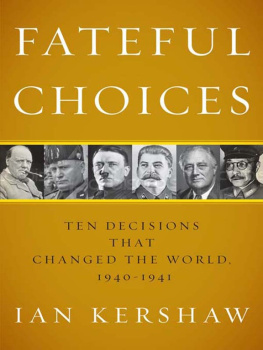Praise for The More Beautiful World Our Hearts Know Is Possible
God damn this is good! This version of the big story by Charles Eisenstein is one of the best I have ever heard. Charles, you are speaking for millions of us and we so know what you are saying to be true. We will absolutely tell the whole fucking world about it.
BRAD BLANTON, author of Radical Honesty
The more beautiful world I inhabit accords with Charles Eisensteins vision: a world where we embrace the shadow and give it name so that the healing can begin. Take this book and let it seep into your very being.
POLLY HIGGINS, author of Eradicating Ecocide,
barrister and earth lawyer
This book will change your world. It is beautiful because Charles Eisenstein has the courage to be vulnerable and it is in acknowledging our vulnerability that we will realize our greater humanity.
REVD PETER OWEN-JONES, presenter of
Around the World in 80 Faiths, author, and priest
Other books by Charles Eisenstein:
The Ascent of Humanity
Sacred Economics
The Yoga of Eating
Electronic Edition: ISBN 978-1-58394-725-8
Copyright 2013 by Charles Eisenstein. Some rights reserved. This work is licensed under a Creative Commons Attribution-Non Commercial-No Derivs 3.0 Unported License. For more information, please visit http://creativecommons.org/licenses/by-nc-nd/3.0.

Published by
North Atlantic Books
P.O. Box 12327
Berkeley, California 94712
Cover image: Italiaans landschap met parasoldennen, by Hendrik Voogd (1807)
Cover design by Mary Ann Casler
The More Beautiful World Our Hearts Know Is Possible is sponsored by the Society for the Study of Native Arts and Sciences, a nonprofit educational corporation whose goals are to develop an educational and cross-cultural perspective linking various scientific, social, and artistic fields; to nurture a holistic view of arts, sciences, humanities, and healing; and to publish and distribute literature on the relationship of mind, body, and nature.
North Atlantic Books publications are available through most bookstores. For further information, visit our website at www.northatlanticbooks.com or call 800-733-3000.
The Library of Congress has cataloged the printed edition as follows:
Eisenstein, Charles, 1967
The more beautiful world our hearts know is possible / Charles Eisenstein.
pages cm
ISBN 978-1-58394-724-1
1. Consciousness. 2. Humanity. I. Title.
BF311.E416 2013
158.1dc23
2013013696
v3.1
To the humble,
whose invisible choices are healing the world.
I t was just four years ago that my work was nearly unknown, and I was bankrupt, working part-time in construction, writing in whatever moments single fatherhood allowed. It is through the generosity of countless friends and supporters that my life has changed so radically since then.
In the last three years I have spoken at least three hundred times in over a hundred cities. None of these events did I organize myself or pay anyone to organizeeach was a gift from people who donated their time, energy, networks, and organizational abilities. Nor did I instigate any of the podcasts, interviews, and films that Ive been part of. I am able to be of effective service only because so many others serve the same thing. My work is truly a collective effort.
The people who have played this role are too numerous to mention. The same goes for the hundreds who have welcomed me into their homes, fed me, and driven me around everywhere I visit. Dear hosts, your generosity has sustained me in more ways than you know, reminding me of the truth of what I write about. Likewise the thousands of people who have given me money online or at events, validating the gift principle by which I make my work freely available. Thanks to your generosity, I am able to continue writing and speaking as I support four children.
In addition to all these people, who will have to remain nameless here, I do want to name some who have had a direct impact on the present book. I want to thank Ken Jordan and Daniel Pinchbeck for their total editorial license in publishing the essays in which I developed many of the ideas herein; Andrew Harvey, for our spirited conversations that pushed me into new territory in my thinking about evil, as well as for his unstinting enthusiasm for my work; Joshua Ramey, for his friendship at a key moment of doubt; Patsy, my ex-wife, for staying with me in the crucible of healing; North Atlantic Books, for indulging my unusual demands around copyright, cover art, and editing; and Marie Goodwin, who appeared out of nowhere to assist me with scheduling, logistics, communication, research, and sanity. I would also like to mention with appreciation the following: Glenn Baumgartner, O.J. Haugen, Brad Laughlin, Cynthia Jurs, Polly Higgins, Satish Kumar, Mark Boyle, Manish Jain, Ian MacKenzie, Filipa Pimenatal, Trenna Cormack, Jeff Dardozzi, Filiz Telek ah, now that Ive gotten going I want to list hundreds more. Many I have not listed have been just as important as those I have.
Finally and most of all I want to thank my wife, Stella, whose presence in my life has changed everything.
S ometimes I feel nostalgic for the cultural mythology of my youth, a world in which there was nothing wrong with soda pop, in which the Super Bowl was important, in which America was bringing democracy to the world, in which the doctor could fix you, in which science was going to make life better and better, and they just put a man on the moon.
Life made sense. If you worked hard you could get good grades, get into a good college, go to grad school or follow some other professional path, and you would be happy. With a few unfortunate exceptions, you would be successful if you obeyed the rules of our society: if you followed the latest medical advice, kept informed by reading the New York Times, got a good education, obeyed the law, made prudent investments, and stayed away from Bad Things like drugs. Sure there were problems, but the scientists and experts were working hard to fix them. Soon a new medical advance, a new law, a new educational technique would propel the onward improvement of life. My childhood perceptions were part of a narrative I call the Story of the People, in which humanity was destined to create a perfect world through science, reason, and technology: to conquer nature, transcend our animal origins, and engineer a rational society.
From my vantage point, the basic premises of this story seemed unquestionable. My education, the media, and most of all the normality of the routines around me conspired to say, Everything is fine. Today it is increasingly obvious that this was a bubble world built atop massive human suffering and environmental degradation, but at the time one could live within that bubble without need of much self-deception. The story that surrounded us was robust. It easily kept anomalous data points on the margins.
Next page
